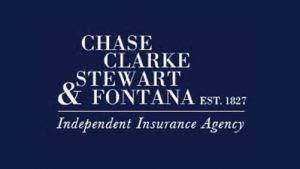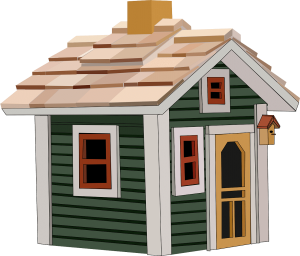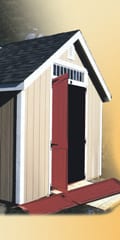With creepy clowns in the news and Halloween around the corner, homeowners are concerned about vandalism. What can you do to protect your home from mischief?
What insurance coverage is available to you the homeowner for vandalism?
 Damage to your home because of vandalism or malicious mischief to your home is usually covered under Coverage A of your Homeowners Policy.
Damage to your home because of vandalism or malicious mischief to your home is usually covered under Coverage A of your Homeowners Policy.
Damage to your vehicles would be covered under your auto policy if you have comprehensive coverage.
The amount of coverage varies, depending on your deductible and what is listed on your policy. We recommend that you review your coverage today, with your local agent, so there are no surprises later.
Take precautions to protect your valuables.
- Keep the outside of your home well-lit to make your home less appealing to vandals.
- Be sure to lock all windows and doors.
- Bring valuable items inside before it gets dark.
We are standing by to answer further questions you may have.
Solar, solar, everywhere!
Solar energy is one renewable energy that has become a hot topic among homeowners. (Pardon the pun.)
That being said, the question is, how are they insured?
Is there insurance coverage for solar panels? Who is responsible for insuring them?
If you own solar panels:
As of now, there is no specific insurance policy for solar panels. If you own solar panels that are on your residence or property you would have coverage through your homeowner's policy. It's key that you notify your local agency and update your policy as soon as you have them or better yet before you buy, or you may not have the necessary coverage. Call us for more information.
If you lease:
When leasing solar panels, usually the company you lease from is responsible for insuring them. Be sure to have a clear understanding of your contract. Also be aware that if you sell your home while still in a lease, the solar company could have a say in who buys your home. Be careful whenever you have a contract. Call your local insurance agent for more information.
We are here to help with any further questions you may have.
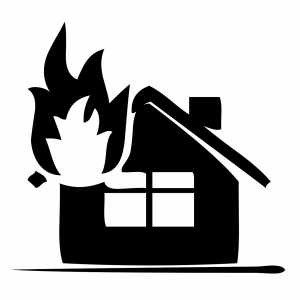 Have you taken an inventory of your belongings?
Have you taken an inventory of your belongings?
This is a reminder to take some time now to go through your home and create an inventory of your valued items.
Take this situation:
A fire breaks out in the home, causing severe interior damage. The structure of your home remains intact but everything else is a loss. You find yourself needing to replace everything from appliances to clothing and even your toothbrush. The good news is, you have insurance so you are covered and will be reimbursed... But do you remember all the contents items in your house? Now is the time you wish you'd taken pictures or had a video of the inside of the house.
Don't let this happen to you...
Here are a few things to remember when taking an inventory...
- Take 3 or 4 pictures of each room.
- When taking pictures, don't forget to open the cabinets and closets. You have more clothes than you think!
- Make a separate list of the items that can't be replaced
- Your valuable items may need to be appraised.
- Call our office with your list. 413-788-4531.
Being Proactive (before a loss) will save you time and energy.
Feel free to call us with further questions.
In New England, gold comes in another shade... white (snow). Well, at least for snowplow drivers!
Winter weather can mean big business for local small businesses. When most of us are home riding out the snowstorm there are a few people that head out in the middle of the night to start plowing. Does your small business do any of the following;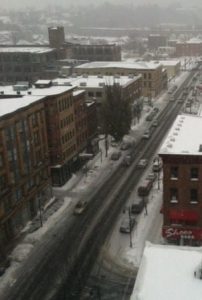
Do you sand?
Do you shovel?
Do you roof rake?
Do you plow public roads?
Coverage for Snowplow Damage?
Does your small business snowplow in the winter? Let's say you have a fleet of trucks that are all commercial vehicles. Winter comes around and you, the owner, decide to start plowing. Suppose one of your drivers hit a curb and damages the vehicle while plowing. Are you covered?
In most cases, if you do not have the snowplow endorsement on your commercial policy then you may be stuck without a shovel. Your Business Owners' policy may exclude coverage for snowplows.
Have you heard of this new Tiny House Trend? How do these tiny homes interact with your insurance coverage?
Tiny Homes and Your Policy...
The "Tiny House" is a new trend encouraging people to simplify their lives and reflect on how much space is really needed to live. Usually, these homes are a maximum of 400 square feet. Some are built on trailers while others are fixed to a permanent foundation. Insurance companies are working on how best to provide coverage for these new houses.
We are finding that they are being broken down into two types of coverage.
- Dwelling Fire or Speciality Homeowners policy.
- If the structure is attached to a permanent foundation.
- Travel Trailer policy.
- If wheels are intact.
In either case, the house would need to be inspected and meet certain standards before it would be insured.
Contact your local agent to learn more.
Are you eager to get to the campground? We are excited too! But there are some things to do before you go. Have you checked to make sure you have the right coverage for your recreational vehicle? There may be gaps in your coverage...
Is your Recreational Vehicle covered?
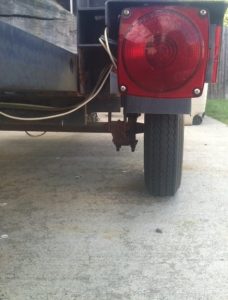
If you say yes to any of the following, it could mean no:
- I own a Camper
- I own a Recreational Vehicle
- I own a Trailer
If your Camper, RV, or trailer is not listed on your current auto policy you may not have the coverage needed for your upcoming trip.
Contact your local agent to confirm coverage.
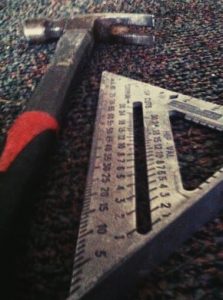 This time of year many people are thinking about spring cleaning, even home renovations. Are you one of them?
This time of year many people are thinking about spring cleaning, even home renovations. Are you one of them?
Will you be covered for a kitchen renovation or bath remodel??
Homeowner's policies typically cover the value of the home. Kitchen renovations add value to the home. If you add value to the home by renovating and or adding square footage, it is important to keep your local agent in the loop and also update your existing homeowner's policy. If you do not, and then something happens to your home, you may not have the coverage needed for repairs.
Contact your local agent for more information...
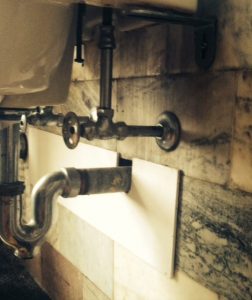 If your pipes burst in this cold winter weather, are you covered?
If your pipes burst in this cold winter weather, are you covered?
Well, the good news for you is that water damage is one of the most commonly filled insurance claims. That being said, you should know that not all claims are covered for frozen pipes. If your home sustains "sudden and accidental" water damage from bursting pipes, then you would be covered. If the leak is slow or has caused damage over a long period of time you may not have coverage. This is why it is good to be on the lookout for water damage or broken pipes especially this time of year.
Also please note that if the following are true you may not be covered:
- The frozen pipes that burst have not been properly maintained.
- You are away from your home and the pipes burst due to a lack of heat in the home.
It's best to contact your local agent for further details of coverage before you have a claim.
Is your electric bicycle covered by your Homeowners or Auto policy?
 Then Listen Up... The short answer is No. Unfortunately, the electric bicycle falls into a class of its own. Electric bicycles have a motor and need registration, and would not have the same coverage options as a standard bicycle. Certain carriers have made an endorsement for these, but they require you to have a Motorcycle policy.
Then Listen Up... The short answer is No. Unfortunately, the electric bicycle falls into a class of its own. Electric bicycles have a motor and need registration, and would not have the same coverage options as a standard bicycle. Certain carriers have made an endorsement for these, but they require you to have a Motorcycle policy.
This is similar to mopeds as well. Now is the time to make sure you don't have gaps in your coverage.
Ask your local agent today...
Do you own a boat? If so summer is the best time of year. Do you have the right coverage for your boat?
Boat Insurance protects you in the following situations...
- Boat Insurance covers physical damage to the watercraft.

- Personal liability in the event of bodily injury to yourself and others.
- Towing expenses in the event of your boat is disabled and in need of emergency repair
- The trailer for the boat would be covered
- Personal Property including apparel equipment and other property owned by the insured or guests on the boat.
Please ask your local agent for further details of coverage...
Please also inquire about discounts that are available... don't miss out, call today...
This time of year many of us prefer to BBQ in the backyard and enjoy time with the family! We hope you have a great summer.
Grilling is all fun and games 'til someone gets hurt'

Please be careful!
That being said, if you should have a grilling or BBQ accident and a fire damages your property... Are You Covered??
Fire damage on your property is covered by most common Homeowner's Policies. So for example, if your deck was destroyed by fire you would have coverage. The amount reimbursed would be based on the value of property and policy limits.
Homeowner's policies also include some liability coverage, in the event of injury. Now would be a great time to consult with your local agent and make sure there are no gaps in your coverage.
We are happy to answer further questions...
Potholes are everywhere this time of year. Unfortunately, it is commonplace due to winter elements.
If you hit one and damage your car, are you covered?
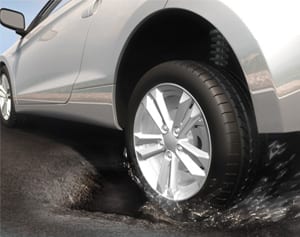
This would be covered under Collision, in your auto policy. Collision covers accidental damage to your auto that is caused by a collision. The amount reimbursed is determined based on the cash value of parts and repairs. Contact us for more specific information.
In most cases, your deductible is set at $500.00 unless other amounts have been selected.
*Your policy covers collision loss for an accident that occurs while your auto is being operated by a household member listed on the policy. If someone in your household drives your auto on a regular basis make sure they are listed on your auto policy.
Contact us today for more information.
You know what they say... "April Showers bring May flowers." We hope that's all they bring this year. Rainwater is important to our environment, however, sometimes nature doesn't nurture...
Water Damage caused by the following is not covered by your homeowner's policy:
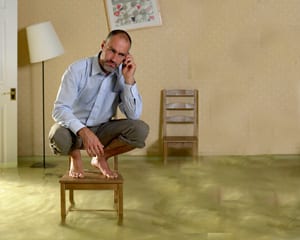
- Groundwater seeping into your building, sidewalk, driveway, foundation, swimming pool, or other structure.
- Flood, surface water, waves, tidal water, overflow of a body of water...
*However if your home caught fire, suffered an explosion, or theft because of water damage you would be covered.
Act now to make sure your basement is leak-free, and if you are prone to flooding prepare with a sump pump.
To be covered for flooding you would need a flood policy
Contact your local agent for further questions...
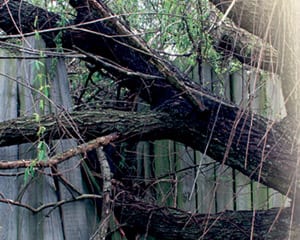 With all the wild weather lately many people wonder if your tree damages your neighbor’s property are you responsible?
With all the wild weather lately many people wonder if your tree damages your neighbor’s property are you responsible?
Acts of nature are beyond our control. You would not be responsible for the damage. Repairs would be covered by your neighbor's homeowner policy.
However if damage results from an unhealthy, or previously damaged tree, that you were aware of and possibly put on notice for then you would be responsible.
Unless you have a snowmobile policy, chances are you do not have the right coverage for damage to the snowmobile or injury to yourself or others...
We hope you have a fun winter and enjoy your winter sports.

Snowmobiles require some maintenance, both physically and for coverage. Have you thought about if you have the right coverage for your snowmobile? It’s all fun and games until someone gets hurt. If you are involved in an accident while using your snowmobile, your home or auto policy will not offer coverage for any bodily injury.
*This is the same when borrowing someone's snowmobile.
Protect your investment and your pockets. If you should have an accident, what will you do? In addition to a snowmobile policy, A Personal Umbrella may be just the thing for you. It protects liability.
The Personal Umbrella doesn't cost as much as you think.
We are happy to tell you more... Contact us today
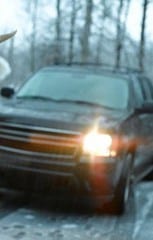
Oh, deer!!!!
Please be careful of deer, especially while driving in wooded areas. Deer tend to be out around dusk and dawn. If you hit a deer while driving… are you covered??
You are covered if you have a comprehensive on your auto policy. The deductible would apply, but the good news is there would not be a surcharge for this type of single-car accident. You may not have all the coverage you need. Feel free to contact us for more information today.
Drive safe.
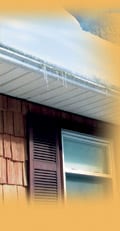 Yes, there would be coverage. It would either be covered under Dwelling or Other structures depending on whether the garage is attached to the house or not.
Yes, there would be coverage. It would either be covered under Dwelling or Other structures depending on whether the garage is attached to the house or not.
Review your other structures to confirm you have enough coverage. Examples of other structures include your fence, garage, shed, gazebo, barn, & possibly your pool.
Your personal property would also be covered if damaged, as a result of the collapse.
You may not be covered by your homeowner's policy if the garage is used for business. In this case, you would need commercial coverage for the building and property. We handle both types of insurance. Should you need more information we are only a call away.

Hotel Expenses During A Power Outage
This area has seen some wild weather in recent years. We all remember the Frankenstorm of 2011. This brings up the thought of an extended power outage. No one wants this to happen again, but it is a sobering reminder of how quickly things can change. Well, what if you experience a power outage for an extended period of time and are forced to stay in a hotel… Will you be covered?
Assuming there is no other damage from the storm, claims for a hotel stay (or generators) are seldom covered under a homeowner’s policy. However, due to a preexisting medical condition, your hotel stay may be covered.
In emergency situations, state aid has been made available for application in the past. Preparation is key in cases like this. Make sure your family has an evacuation plan in place.
Please contact our office for further concerns or questions relating to property coverage.
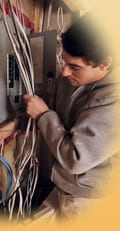
Water Damage around your electric panel is not something you want. Let’s hope it does not happen to you. If it does, there is some good news and some bad news.
Good news, if the damage is caused by a leaky pipe or your window is smashed during a storm and water enters through that broken window...YES, there is coverage.
The bad news, if the damage is caused by groundwater you are not covered. For Example, if heavy rain causes flooding in your basement or the water from the ground leaks in through a crack in the foundation...there is NO coverage.
Now would be the time to make sure you are protecting yourself against flood damage especially if you are in a flood zone. Be aware of the recent flood mapping changes. You could now be in a flood zone. Flood policies are the only way to cover flood damage. You cannot add flood coverage under any other policy.
For more information feel free to contact us.
The simple answer would be yes. Your fence is covered under your homeowner’s policy- Coverage B. However there are a number of variables as to how much you will be reimbursed. Your insurance company will provide you with the cash value of the fence at the time of the loss. The policy covers the actual cash value for the cost of repair or replacement.
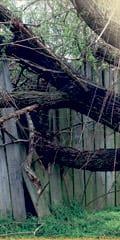
*Something to note is that you will not be reimbursed based on the cost of a new fence. Some fences depreciate faster than others. Stockade fences depreciate quickly, whereas iron or vinyl hold their value longer, especially if properly maintained.
This brings us to the question of tree debris removal.
Homeowners policy reasonable expenses provide up to $500.00 for removal of trees felled by such windstorms or hail. Provided the tree damages the covered structure. There may be an endorsement that provides a limit for the removal of a fallen tree not damaging a structure.
*If you live in coastal areas you will have a slightly higher deductible, which will be applied to windstorm or hail losses.
We are happy to answer any further questions you may have. Call us today!
Please also note our blog on Hurricane Preparedness Click Here
Yes it is covered by your typical homeowner's policy under coverage C (personal property)
Coverage C insures for direct physical loss resulting from;
- Fire or lightning

- Windstorm
- Explosion
- Riot or Civil Commotion
- Aircraft
- Vehicles
- Smoke
- Vandalism
- Theft etc… (please see your policy for a complete listing of coverage)
The shed is on the "residence premises" and thus is covered in the event of theft. However, if this lawnmower is used commercially you need to take additional steps to ensure it. Your limits may need to be adjusted.
For more information contact your local agent. We also provide free insurance reviews.
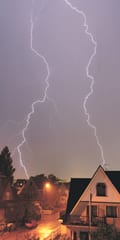 Sadly the National Weather Service reports that lightning causes an average of 4,400 home structure fires each year. Summertime is prime time for lightning strikes, so it’s best to be prepared.
Sadly the National Weather Service reports that lightning causes an average of 4,400 home structure fires each year. Summertime is prime time for lightning strikes, so it’s best to be prepared.
In short, you are covered, under the Homeowners-3 (all peril) policy & Dwelling Property (DP-3) policy. Companies will replace the damaged items. However, they first will want to know if the damaged items can be repaired. If the items cannot be repaired the company will require a written explanation as to why they cannot.
For questions or to learn more about your coverage options contact us at www.chaseins.com. We would be happy to provide you with a free quote. For more lightning safety tips click the link below.
Well, that depends on what your definition of covered is. The standard homeowner's policy contract provides up to $1,000 to $1,500 for jewelry

depending on which version of the homeowner's policy that you have. So, if you have a stolen Rolex valued at $7,000 you will come up a bit short. This limit applies to jewelry, watches, precious and semi-precious stones, and furs.
It is recommended that you obtain appraisals from a certified appraiser to determine the value of your personal items. Once you have had an appraisal contact your independent insurance agent to discuss your coverage options. You may wish to list/schedule your items onto your homeowner's policy, or obtain a valuable articles policy. In most cases, you can just add your items to your homeowner's policy.
Scheduling your items will not only cover them for theft, but it will broaden your coverage to include loss, in most cases.
Contact your independent insurance agent for more information.
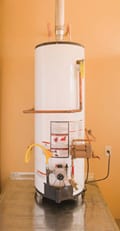 Well then. Let's hope this never happens to anyone..... So, let's break this down a bit. An explosion is a covered peril under the Homeowners 3 Special form. Coverage is provided under Section I Property Coverages extending coverage to both the dwelling structure and personal property. So, if your hot water heater explodes, you have coverage under your Homeowners 3 Special form for your structure and personal property.
Well then. Let's hope this never happens to anyone..... So, let's break this down a bit. An explosion is a covered peril under the Homeowners 3 Special form. Coverage is provided under Section I Property Coverages extending coverage to both the dwelling structure and personal property. So, if your hot water heater explodes, you have coverage under your Homeowners 3 Special form for your structure and personal property.
Now, what if your hot water heater is located in your garage, blows up, and damages or destroys your riding lawnmower, car, and motorcycle?
Good and bad news here. The good news is that your riding lawnmower and any other personal property that was destroyed or damaged by the explosion would be covered under your Homeowners 3 Special form. The bad news is that the car and motorcycle are not covered by your Homeowner's policy. Motor vehicles and motorcycles are subject to registration and separate insurance requirements. In other words, you would need to file a claim against your car and motorcycle insurance policy and hope that you purchased comprehensive coverage, of which Explosion is a covered peril.
Again, I hope this never happens to anyone.
To learn more contact your independent insurance agent or visit chaseins.com
Well, to answer this question let's first look at the insurance definition of mold.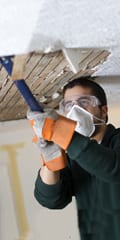
Fungi - A. “Fungi” means any type or form of fungus, including mold or mildew, and any mycotoxins, spores, Scents, or by-products produced or released by fungi. B. Under Section II, this does not include any fungi that are, are on, or are contained in, a good or product intended for consumption.
Now that we know how the homeowner's contract defines mold, let's answer the question. Yes, if you have a standard Form H03 Insurance policy you will have limited coverage for “Fungi” under Section (I) and Section (II).
Section (I) (Property Coverage) provides $10,000 as the total amount that will be paid for a covered property loss involving “Fungi”.
Section(II) (Personal Liability Coverage) provides $50,000 as the total amount that will be paid for a covered Personal Liability loss involving “Fungi”.
Contact your insurance agent should you wish to inquire about purchasing higher “Fungi” limits. In some cases section (I) limits can be increased to $25,000 or $50,000 and Section (II) limits can be increased to $100,000.
Sinkholes are NOT Covered Under the Home or Dwelling fire policies!
Did you know that Massachusetts has already suffered sinkholes? Road buckles in Fall River creating huge sinkhole - March 30, 2010; Water main break causes sinkhole in Lowell - October 12, 2011; 17-foot deep sinkhole emerges in Holyoke, MA - March 13, 2013. The good news is that you can purchase the sinkhole collapse endorsement for your home and dwelling policies. Don't forget about earthquake coverage. See the Home and Dwelling fire policy exclusions below.
Section I - Exclusions
We do not insure for loss caused directly or indirectly by any of the following. Such loss is excluded regardless of any other cause or event contributing concurrently or in any sequence to the loss. These exclusions apply whether or not the loss event results in widespread damage or affects a substantial area.
Earth Movement
- Earthquake, including land shock waves or tremors before, during or after a volcanic eruption;
- Landslide, mudslide, or mudflow;
- Subsidence or sinkhole; or
- Any other earth movement including earth sinking, rising or shifting caused by or resulting from human or animal forces or any act of nature unless direct loss by fire or explosion ensues and then we will pay only for the ensuing loss.
This Exclusion A.2. does not apply to loss by theft.
The ISO DP-3 states:
General Exclusions
We do not insure for loss caused directly or indirectly by any of the following. Such loss is excluded regardless of any other cause or event contributing concurrently or in any sequence to the loss. These exclusions apply whether or not the loss event results in widespread damage or affects a substantial area.
Earth Movement
- Earthquake, including land shock waves or tremors before, during or after a volcanic eruption;
- Landslide, mudslide, or mudflow;
- Subsidence or sinkhole; or
- Any other earth movement including earth sinking, rising or shifting; caused by or resulting from human or animal forces or any act of nature unless direct loss by fire or explosion ensues and then we will pay only for the ensuing loss.
Under the HO policy, the HO 04 99 Sinkhole Coverage endorsement is necessary to buy back sinkhole collapse.
HO 04 99 Sinkhole Collapse endorsement states:
A. Definitions
The following definition is added:
“Sinkhole collapse“ means actual physical damage arising out of, or caused by sudden settlement or collapse of the earth supporting such property. The settlement or collapse must result from subterranean voids created by the action of water on limestone or similar rock formations.
B. Coverage
We insure for direct physical loss to property covered under Section I caused by “sinkhole collapse.“
C. Exception To The Earth Movement Exclusion
The Earth Movement Exclusion does not apply to “sinkhole collapse.“ Under the DP policy, one needs to add DP 04 99 Sinkhole Collapse which reads similarly. We also must remember that the peril of earthquake is excluded and needs to be bought back. The HO 04 54 Earthquake Endorsement is necessary to add earthquake back to the homeowner's policy and DP 04 69 Earthquake is used for the Dwelling Policy.

Answer: If your babysitter, mailman, neighbor, or anyone else who is not defined as an insured breaks their leg in your home or on your property. The short answer is maybe.
There are two coverage parts under Section II - Liability coverage. The first part is Coverage E - Personal Liability and the second is Coverage F- Medical Payments to others. Each claim is investigated to determine negligence. If the insured is found negligent then coverage may be available under your Personal liability coverage part E or Medical payments to others Part F.
Coverage E Personal Liability - If a claim is made or a suit is brought against an "insured" for damages because of "bodily injury" or "property damage" caused by an "occurrence" to which this coverage applies, we will:
- Pay up to our limit of liability for the damages for which the "insured" is legally liable. Damages include prejudgement interest awarded against the "insured"; and
- Provide a defense at our expense by counsel of our choice, even if the suit is groundless, false, or fraudulent. We may investigate and settle any claim or suit that we decide is appropriate. Our duty to settle or defend ends when the amount we pay for damages resulting from the "occurrence" equals our limit of liability.
Coverage F Medical Payments To Others: - Pays the necessary medical expenses that are incurred or medically ascertained within three years from the date of an accident causing "bodily injury."
- To a person on the "insured location" with the permission of an "insured" or
- To a person off the "insured location", if the bodily injury:
- Arises out of a condition on the "insured location" or the ways immediately adjoining;
- Is caused by the activities of an "insured";
- Is caused by a residence employee in the course of the residence employee's employment by an insured; or
- Is caused by an animal owned by or in the care of an "insured
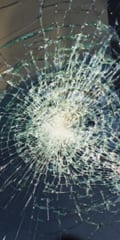
The answer is yes if you carry rental reimbursement coverage. Rental reimbursement coverage provides limits of insurance in the amount of $15 to $100 per day. Rental reimbursement coverage provides coverage in the event that your vehicle is damaged due to a covered loss. Coverage does not exist for vehicle breakdown or maintenance. Call us for more information.
Your windshield is cracked...Are you covered?
The answer is yes if you carry comprehensive insurance coverage. The best part is that glass coverage has a zero deductible in most cases. The comprehensive insurance coverage covers a lot more than just cracked windshields. It covers many perils and is commonly referred to as other than collision coverage. A collision with a bird or animal like a bear would be covered under comprehensive coverage.
Comprehensive covers
- Fire
- Theft
- Vandalism
- Earthquake
- Windstorm
- Hail
- Riot
- Civil Commotion
- Flood
- Collision with a bird or animal
- Explosion
Answer: Unfortunately not. The medical payments coverage on your Homeowner's policy does not extend to your relatives who are “household residents”. Your mother-in-law would have to use her own health insurance for coverage. As an insured under a homeowners insurance policy you cannot collect from your liability section. The definition of an insured is:
"Insured" means you and residents of your household who are:
- Your relatives; or
- Other persons under the age of 21 and in the care of anyone named above
 Now, let's say your mailman, neighbor, or anyone else who is not defined as an insured breaks their leg in your home or on your property. Are they covered?
Now, let's say your mailman, neighbor, or anyone else who is not defined as an insured breaks their leg in your home or on your property. Are they covered?
Well, that's a good question. The short answer is maybe. There are two coverage parts under Section II - Liability coverage. The first part is Coverage E - Personal Liability and the second is Coverage F- Medical Payments to others. Each claim is investigated to determine negligence. If the insured is found negligent then coverage may be available under your Personal liability coverage part E or Medical payments to others Part F.
Coverage E Personal Liability - If a claim is made or a suit is brought against an "insured" for damages because of "bodily injury" or "property damage" caused by an "occurrence" to which this coverage applies, we will:
- Pay up to our limit of liability for the damages for which the "insured" is legally liable. Damages include prejudgement interest awarded against the "insured"; and
- Provide a defense at our expense by counsel of our choice, even if the suit is groundless, false, or fraudulent. We may investigate and settle any claim or suit that we decide is appropriate. Our duty to settle or defend ends when the amount we pay for damages resulting from the "occurrence" equals our limit of liability.
Coverage F Medical Payments To Others - Pays the necessary medical expenses that are incurred or medically ascertained within three years from the date of an accident causing "bodily injury."
- To a person on the "insured location" with the permission of an "insured" or
- To a person of the "insured location", if the bodily injury:
- Arises out of a condition on the "insured location" or the ways immediately adjoining;
- Is caused by the activities of an "insured";
- Is caused by a residence employee in the course of the residence employee's employment by any insured; or
- d. Is caused by an animal owned by or in the care of an "insured".
Please click here to view the entire Homeowners policy (H03) Special form
Generally, if you have liability part 5 Optional Bodily Injury liability coverage and physical damage coverage (collision and comprehensive) coverage, the coverage will follow you to the car you are renting everywhere in the U.S and Canada. If you are in Mexico, overseas, or anywhere outside the U.S and Canada, you must purchase insurance coverage through the rental car company.
Note: Liability Part #1 only applies to accidents that occur in Massachusetts. In order to have bodily injury coverage outside of Massachusetts, you must purchase part 5 (Optional Bodily Injury) coverage. Parts 3 Uninsured and Part 12 Underinsured will follow also.
Your personal automobile insurance will follow for personal type vehicles, no buses, or commercial trucks, etc...
Rental Reimbursement coverage on your policy does not cover damage to or caused by rental cars. If you have this coverage part listed on your policy, you can only use it to rent a replacement vehicle if your personal vehicle is not usable due to a covered accident. This coverage does not afford coverage to a rental or damage caused while you are driving a rental car.
Reasons to purchase insurance coverage from the car rental agency:
- Loss of use coverage: The period of time that the damaged rental car is being repaired and not usable by the car rental company. Loss of use coverage is not covered under your automobile insurance policy.
Check with your credit card company. Some credit card providers offer free coverage if you use their card to pay for a car rental. Be sure to read/ask for an exact description of what is and what isn't covered.
If you chose to purchase insurance from the rental company, check to see what is and what is not covered. If personal effects are not covered, they may be covered by your homeowners or renters insurance policy. The Damage waiver coverage may duplicate coverage you have on your policy. Supplemental liability coverage may provide more liability coverage than you carry on your policy. If you have adequate liability coverage on your car and an umbrella policy if you own a home and auto, you may want to forgo this coverage. Call us to review your current coverage before making this decision.
Answer: Fire damage is covered most of the time. There are certain situations where fire damage is not covered under a homeowner’s policy.
The purpose of a home insurance policy is to protect the owner against sudden and accidental financial losses, within certain limits, due to a number of perils. The most common perils include fire, theft, vandalism, smoke, lightning, impact by aircraft or land vehicles, explosion, and riot. Fire damage is a big concern for most homeowners.
There Are Certain Situations Where Fire Damage Is Not Covered Under A Homeowner’s Insurance Contract. Here Are Two Of Them:
- Arson - The willful or malicious burning of property (as a building) by the property owner especially with criminal or fraudulent intent.
- Vacancy - Another case where the damage caused by the fire would not be covered by the homeowner’s insurance contract is if the home was vacant at the time of the fire. A home is considered to be vacant if it has not been resided in for more than 30 consecutive days, or if the owner has moved out and has no intention of returning. The insurance company will launch a full investigation and if they can prove that the property was vacant, they will not provide any coverage for damages sustained.
Answer: It depends, flood damage is NOT covered under most homeowners' policies. A separate flood insurance policy must be purchased.
What is a Flood?
Flood insurance covers direct physical loss caused by “flood.” In simple terms, a flood is an excess of water on land that is normally dry. Here’s the official definition used by the National Flood Insurance Program. A flood is “A general and temporary condition of partial or complete inundation of two or more acres of normally dry land area or of two or more properties (at least one of which is your property) resulting from:
- Overflow of inland or tidal waters;
- Unusual and rapid accumulation or runoff of surface waters from any source;
- Mudflow*; or
- Collapse or subsidence of land along the shore of a lake or a similar body of water, as a result of erosion or undermining caused by waves or currents of water exceeding anticipated cyclical levels that result in a flood as defined above.”
*Mudflow is defined as, “A river of liquid and flowing mud on the surfaces of normally dry land areas, as when the earth is carried by a current of water…”
Did you know:? Almost everyone is in a flood zone!
Answer: Yes, If a bear crashes through your window, your Homeowner's policy will cover it, subject to your policy deductible.
But what if the bear then comes into the house and damages your contents and personal property? Under the standard Homeowners policy there would not be covered, but if your policy includes “special personal property coverage”, you’re all set!
Animal damages not covered by home insurance.
Animals owned or kept by an insured are not covered by home insurance as well as vermin, rodents, insects, and birds. Please note the descriptions below:
Vermin
- Various small animals or insects, such as rats or cockroaches, are destructive, annoying, or injurious to health.
- Animals that prey on games, such as foxes or weasels.
Rodent
- Any of various mammals of the order Rodentia, such as a mouse, rat, squirrel, or beaver, characterized by large incisors adapted for gnawing or nibbling.
Insect
- Any of numerous usually small arthropod animals of the class Insecta, having an adult stage characterized by three pairs of legs and a body segmented into head, thorax, and abdomen and usually having two pairs of wings. Insects include flies, crickets, mosquitoes, beetles, butterflies, and bees.
- Any of various similar arthropod animals, such as spiders, centipedes, or ticks.
Bird
- Any of various warm-blooded, egg-laying, feathered vertebrates of the class Aves, having forelimbs modified to form wings.
- Such an animal hunted as a game.
- Such an animal, especially a chicken or turkey, used as food.
Answer: Yes, Water Damage Which Occurs From Any Interior Plumbing Device Is Covered, Even If It’s A Bathtub Or Toilet That Overflows!
Did you know that water damage is one of the most commonly filed home insurance claims? This should not come as a total surprise considering the many possible causes of water damage - heavy rain, bursting of pipes, or the bathtub accidentally overflowing.
Despite the fact that water damage is a common claim, not all water damage claims are covered.
Water damages generally covered by home insurance.
In general, your home insurance covers water damages caused by burst pipes, leaks in the roof, or when water overflows from the sink, bathtub, dishwasher, hot water heater, or washing machine. The key to a water damage claim is that it must be “sudden and accidental”. Water damage that is the result of prolonged, slow leakage is generally considered maintenance and would not be covered.
Water damages generally not covered by home insurance.
Your homeowner's insurance may not cover water damages caused by frozen pipes that burst if you have not maintained proper heat in your home. If you leave your home for extended periods in the winter, you need to make sure that your heat is maintained at an adequate temperature.
Additionally, damage that occurs from water that comes from the surface of the ground or below ground, is not covered. If a heavy rainstorm causes water to flood your basement, that is not covered. Limited coverage for sump pump failure or sewer backup is available by separate endorsement – call our office to make sure you have this additional endorsement on your policy.
Flood is also not covered under a Homeowners policy. If you live near any body of water, even smaller streams, you should consider purchasing a separate Flood Insurance contract.
Answer: Glance around next time you are cruising down the Rte. 91. As many as one out of seven cars hurtling past you could be uninsured. You may be one wrong move away from financial ruin without adequate insurance protection. Then there are those drivers with state minimum insurance coverage. Just because they have insurance does not mean they have enough to cover you or your loved ones should they cause you serious injury. It doesn’t take calculus to figure out that these sums won’t begin to cover Hospitalization, rehab, loss of income, etc. caused by an accident. Accidents are stressful enough. You shouldn’t have to worry about how you will pay for the horrific medical expenses. Consider at least $100,000/$300,000 for parts (3) uninsured (12) Underinsured & $25K for (Medical payments). $250,000/$500,000 limits would be even better, or higher.
Chase, Clarke, Stewart & Fontana has provided auto insurance and great advice to the residents of Massachusetts for over 100 years. Areas served include, Agawam, Longmeadow, Hampden, Wilbraham, Westfield, Southwick, Holyoke, Springfield, South Hadley, Northampton, and all of the surrounding communities.
If you answer YES to any of the following statements, you may suffer an uncovered claim, which could have been covered. Please take a few minutes to read the following. Call your insurance agent if you answer Yes to any of the following questions.
- The named insured on the policy is not occupying the home.
- The amount of insurance coverage on our home is less than 100% of what it would cost to rebuild it.
- The amount of insurance on our contents is less than its replacement value.
- Property used in business (tools, equipment, samples, stock, etc.) is kept in our car or at our home.
- I own a trailer, camper, snowmobile, or recreational vehicle. Call Us to confirm coverage/li>
- I own a boat, outboard motor, or boat trailer.
- We have a total of more than $1000 in jewelry, watches, and furs, $2000 in firearms, $2500 in silverware & pewterware, or $200 in gold, money, or silver.
- I own a second home and or we may rent our second home during the year.
- I have cameras or other hobby equipment which we consider valuables.
- I own antiques, fine arts, stamps, coins, etc.
- I have an office or conduct business out of our home or garage.
- I have a detached garage or other building on our property that is worth more than 10% of our house dwelling coverage.
- I have a sump pump in our basement.
- I have persons other than blood relatives living in my home.
- My home is vacant or unoccupied
- I’ve updated my kitchen, bathroom, or basement or added a dormer, addition, or deck to my home.
- I allow friends or family members to operate my vehicle even though they are not listed on my policy.
- I borrow a household member or friend's vehicle regularly and I’m not a listed driver.
- I have multiple vehicles with different liability limits.
- I have an underground oil tank
- I have custom equipment or furnishings in our vehicle
- I have a snow plow, bed liner, roof rack system, or other item attached to our vehicle
- I own a condominium as a second home and may rent it out.
- I own vacant land.
- I own a condominium and don’t have loss assessment coverage.
You may be surprised to learn that your policy is not covering you the way you thought.
Ordinance and Law coverage is a form of insurance that can be included in your homeowners, property, or commercial property policy to cover you for rebuilding a destroyed property and also upgrading the property to meet the current building codes and or town/city ordinances. Property policies typically include Ordinance and Law coverage at a limit of 10% of the building value. More can be purchased and should in many cases. This coverage could save you from potentially crippling enforcement of local building codes. For example, Ordinance and Law would pay for the increased cost of construction for any increased cost incurred to upgrade to meet current building codes or ordinances.
-
What if after a covered loss to your building, the building code required that you install new wiring throughout not only the damaged portion of the building but to the existing section also.
-
What if your commercial building requires the installation of sprinklers, or handicapped accessibility, or rebuilding with fire-resistant construction, or removal of the undamaged portion of the building?
-
Who would pay you for the value of that undamaged portion that had to be demolished?
-
What if the limited amount of debris removal on your present policy (which is only for the damaged property) is not enough?
None of these scenarios are covered without the Ordinance and Law endorsement or Increased Debris Removal endorsement. These important coverages allow you to choose from undamaged value coverage, demolition, and site clearance of not only damaged property but also undamaged property, as well as increased cost of construction, i.e. upgrades due to code enforcement.
Check your homeowners, property, and commercial property policies today and make sure you have this valuable coverage.
Even in a down economy property values continue to skyrocket. Western Massachusetts property replacement costs continue to increase. Do you have enough coverage to replace your property? You may be surprised.
Contact us today so that we can conduct a property replacement cost analysis to help determine if you are properly insured. You don’t want to be under or over-insured. Say you are insured for $70,000 and your property would cost $100,000 to re-build. That will be a problem seeing as you are only 70% insured to the replacement value of $100,000. This leaves you 30% short and also exposes you to a coinsurance penalty. Most property policies require that the property be insured at least 80% of the replacement value, or loss payments will be reduced by a proportion of the insured value to 80% of replacement value.
Most insurance companies offer an endorsement that will provide full coverage to replace the property in the event of a total loss. Typically, companies require the property to be insured to at least 100% of the replacement value of the property to qualify for this endorsement. As long as this requirement is met, if you have a total loss and it costs more to replace than your limit listed property coverage limit, your insurance policy will be increased. The amount of the increase depends on the endorsement purchased and can be anywhere from 25% to 100%.
All it takes is a simple call to determine if your property is insured properly. Don’t wait until it is too late. Find out today.
